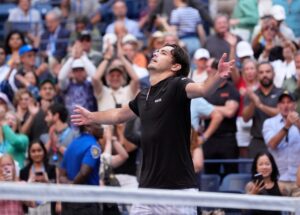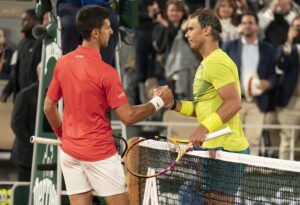This weekend’s Davis Cup Final between France and Croatia will be the last in the competition’s current format, before it is dramatically revised for next year. However, it could just be the last Davis Cup Final full-stop, if the ATP Cup, which is due to be played in Australia at the start of 2020 (just over a month after next year’s Davis Cup competition), proves a success. Tennis can hardly support one international men’s team tournament, let alone two.
If the 2018 Davis Cup Final does prove to be the last in the tournament’s 118-year history, it will have to go some to match the finest finals in that century-plus of men’s team tennis. They were all fought out between two strong teams; they all went down to the wire; and the passion displayed in all of them could leave no-one in any doubt as to the value of the Davis Cup.
Here, then, are the Five Finest Davis Cup Finals.
- 2017: FRANCE BEAT BELGIUM 3-2 IN FRANCE
France are the Davis Cup holders, having beaten near neighbours Belgium in Lille a year ago. For a whole generation of French players and fans, it was the realisation of a long-held dream, as France’s previous Davis Cup triumph had been in 2001 and they had lost three other Davis Cup Finals in the intervening years. The man who oversaw the triumph was Yannick Noah, who had done so much to revive French tennis in the late 20th century, both as a Major winner (he won the French Open in 1983 and 35 years on he remains France’s last male Major-winner) and as a Davis Cup Champion (in 1991, he captained France to its first Davis Cup success in nearly 60 years).
For so many of the French men who had struggled in Noah’s wake, the 2017 triumph was also a vindication and in many ways the biggest victory of their careers, whether as an individual or as a team player. Jo-Wilfried Tsonga, Lucas Pouille and Richard Gasquet all won crucial points, Gasquet in the doubles alongside Pierre-Hugues Herbert after Noah had surprisingly (and controversially) omitted Herbert’s regular doubles partner, Nicolas Mahut.
For Belgium, it was an unwanted hat-trick of three losses in three Davis Cup Finals, and it was a particularly devastating loss for their greatest ever player, David Goffin. After a career-best year in which he first qualified for the ATP Finals and then reached the final (which he lost to Grigor Dimitrov), a week later he won both his singles matches (against Pouille and Tsonga). However, his teammates were unable to win even a single point between them and so the title went to France.
-
Embed from Getty Images
- 2010: SERBIA BEAT FRANCE 3-2 IN SERBIA
Such has been the often insane scheduling of modern tennis that many of the world’s greatest players have had to put their own individual career ahead of representing their country, especially when Davis Cup ties (even quarterfinals and semi-finals) have followed hard on the heels of a Grand Slam tournament. And yet the individual game and team tennis do not have to be mutually exclusive. Indeed, it has often been the case that success in the Davis Cup has provided the springboard for a player to markedly improve their own individual game.
The most spectacular example of that in the entire history of the Davis Cup is Novak Djokovic, who, nearly a decade on from Serbia’s first (and so far only) Davis Cup win, is still the World No.1. However, prior to Serbia’s triumph in 2010, Djokovic had been very much the “Third Man” of men’s tennis. He had won a Major (the Australian Open in 2008), but he had failed to build on that success significantly and by 2010 he was still far behind Roger Federer and Rafael Nadal, both in ranking points and global profile.
Two things helped to change all that. The first was the belated diagnosis (in the summer of 2010) of his gluten intolerance, which enabled him to end the run of illnesses and injuries that had prevented him from competing meaningfully against “The Big Two”. The second was Serbia’s Davis Cup win at the end of 2010, which he spearheaded, winning both his singles matches over Gilles Simon and Gael Monfils, before Viktor Troicki defeated Michaël Llodra to confirm victory for Serbia. And it was Djokovic who summed up what winning the Davis Cup meant to himself and his nation, when he said immediately afterwards, “This is the best moment of my career and probably of my nation. This is like winning the World Cup for us.” And even today the Davis Cup still describes itself as “The World Cup of Tennis.”
Embed from Getty Images
- 1989: WEST GERMANY BEAT SWEDEN 3-2 IN WEST GERMANY
Earlier this year, when Boris Becker reluctantly had to auction off many of his prized possessions to pay off the creditors threatening him with bankruptcy, among the lots on sale was a replica of the Davis Cup trophy that he had won with West Germany in 1988. That year, they had become the first German team of any kind to win the Davis Cup, by beating Sweden in Gothenburg. However, it was the following year’s triumph in Stuttgart against the same opponents that was the finest of the three finals fought out between the northern European rivals in the mid to late 1980s. (Sweden had won the first of them in Munich in 1985.)
1989 was Becker’s greatest year as a player, as it was the only year in which he won more than one Major (he triumphed at both Wimbledon and the US Open that summer) and he ended it in spectacular style by helping West Germany to retain the Davis Cup. He led an otherwise distinctly unstarry West German side (future Wimbledon champion Michael Stich had yet to emerge fully) against a star-studded Swedish side, when the Swedish men’s game was arguably at its peak.
On the first day of singles, Becker beat Stefan Edberg, the man who was so often his nemesis at Wimbledon. (Becker’s 1989 victory against Edberg in the Wimbledon final was the only one of the three finals they played between 1988 and 1990 that he won.) Then he paired up with the virtually unknown Eric Jelen to win a truly epic doubles match against Jan Gunnarsson and Anders Järryd, eventually winning 6-4 in the fifth set. Finally, he defeated Mats Wilander (who a year earlier had won three of the four Majors) in straight sets, even bagelling him in the second set. And even if it wasn’t technically a deciding rubber, there was no doubt that it was still the deciding match, because if Becker hadn’t won against Wilander West Germany would have had no chance of winning the fifth and final singles match. That was proved when Edberg easily beat Carl-Uwe Steeb in a shortened, two-set “dead” rubber.
There have been several so-called “one-man wins” in Davis Cup history, in which a single player has won both their singles matches and been part of a winning doubles pairing. The most recent example was Andy Murray in 2015, when he led Great Britain, almost single-handedly, to their first Davis Cup victory since before the outbreak of World War Two. However, given the standard of the opposition that he faced in 1989, including two fellow all-time greats in Edberg and Wilander, Becker’s spectacular efforts that year were surely the finest “one-man Davis Cup win” of them all.
- 1959: AUSTRALIA BEAT USA 3-2 IN THE USA
Never mind “one-man wins” – for nearly a decade and a half after the end of World War Two, the Davis Cup was effectively a two-team tournament, as the USA and Australia faced each other in a staggering 14 finals in succession to decide which one was the greatest tennis nation on earth (at least on the men’s side of the game). Australia won eight finals to the USA’s six and there were several finals in this period that were only decided in the final rubber. However, arguably the finest of them all was the very last instalment in this remarkable series, the 1959 final in New York.
Australia’s talisman that year was Neale Fraser, even though his team-mates included the great Roy Emerson and the even greater Rod Laver. In 1959, however, neither Emerson nor Laver were yet at their peak, whereas Fraser was. Unlike Emerson and Laver (who would go on to win 12 and 11 Majors respectively), Fraser “only” won three Majors, but crucially they all came within a year, as he first won the US Open in 1959 (and then retained it in 1960) and added the 1960 Wimbledon Men’s Singles title for good measure.
Fraser maintained that magnificent form in the 1959 Davis Cup Final. Like Becker and Murray afterwards, he won both his singles matches and the doubles (alongside Emerson), which was absolutely vital as Laver surprisingly lost both his singles matches. Consequently, although he is often overlooked now in histories of Australian men’s tennis, in which Emerson and Laver feature prominently, Fraser deserves to be lauded for his decisive contribution to the match that ended an extraordinary era of Davis Cup tennis.
- 1927: FRANCE BEAT USA IN THE USA
The finest Davis Cup Final of them all is also the most famous and arguably the most important, as it was instrumental in spreading the game around the world, particularly in continental Europe and even more particularly in France. To this day, France remains the greatest tennis nation on earth, at least as measured by the number of players at all levels that it possesses, and the French love affair with tennis began nearly a century ago, with the unforgettable triumph of “Les Musquetaires” on American soil.
Of course, France already had one truly great tennis player before 1927, the immortal Suzanne Lenglen, who, along with the American Bill Tilden, had done so much to popularise the sport after World War One. However, the French had not fared nearly so well on the men’s side of the game, losing the Davis Cup Finals of 1925 and 1926 to the USA by wide margins (5-0 and 4-1 respectively). In 1927, however, when France faced the USA for a third successive final in Philadelphia, they were determined not to make it a trilogy of defeats and they succeeded in legendary fashion.
Merely mentioning the names of the great players involved on both sides conveys something of the historic nature of the occasion. France’s “awesome foursome” were René Lacoste, Henri Cochet, Jean Borotra and Jacques Brugnon, while the USA boasted both “Big Bill” Tilden (who in 1927 was still the greatest male tennis player in the world) and “Little Bill” Johnston (who himself was a three-time Major winner).
On the first day, Lacoste defeated Johnston in straight sets, but Tilden immediately levelled the match at one point apiece by beating Cochet in four sets. Then came the doubles match, in which Tilden paired up with Frank Hunter, who was good enough as a singles player to make three Major singles finals, to defeat the brilliant French partnership of Borotra and Brugnon in five sets. (After four closely fought sets, the French pair collapsed in the final set to go down 6-0.) And so the USA went into the final day, and the final round of singles, 2-1 up. It seemed inevitable, given that they only needed one more point to win the final, that there would be yet another American triumph.
However, that was to reckon without the magic of the Musquetaires, or at least two of them. First, Lacoste shocked the tennis world by beating Tilden in four sets and then Cochet followed that up by defeating Johnston, again in four sets. The tennis world order had been stood on its head, as the young upstarts France had defeated the reigning superpower America. And having won their first ever Davis Cup, the French were not prepared to give it up, as they won the next five Davis Cups in a row.
The current French side are unlikely to match that historic achievement, especially if (as is feared) the Davis Cup is ultimately overtaken and replaced by the ATP Cup. However, they would happily settle this weekend for winning two in a row to secure their own little piece of Davis Cup history.






